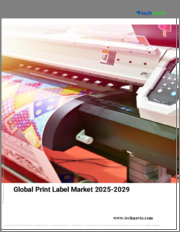
|
시장보고서
상품코드
1453911
스크린 인쇄 라벨 시장 예측(-2030년) : 유형별, 재료 유형별, 인쇄 기술별, 용도별, 최종사용자별, 지역별 세계 분석Screen Print Label Market Forecasts to 2030 - Global Analysis By Type, Material Type, Printing Technology, Application, End User and By Geography |
||||||
Stratistics MRC에 따르면, 세계 스크린 인쇄 라벨 시장은 예측 기간 동안 CAGR 4.12%로 성장할 것으로 예상됩니다.
스크린 인쇄 라벨은 스크린 인쇄 공정을 사용하여 다양한 기판에 인쇄되는 그래픽 디자인 및 정보입니다. 이 방법은 메쉬 스크린을 통해 잉크를 기판에 전사하여 선명하고 내구성이 뛰어난 라벨을 만듭니다. 스크린 인쇄 라벨은 높은 불투명도, 정확한 색상 매칭, 종이, 플라스틱, 금속 등 다양한 소재에 적합하다는 장점이 있습니다. 포장, 화장품, 의약품, 소비재 등의 산업에서 브랜딩, 제품 식별 및 규정 준수를 위해 일반적으로 사용됩니다.
인도상공회의소연합회(FICCI)에 따르면 1인당 소득 증가, 도시화, 여성의 노동시간 증가로 인해 포장식품에 대한 지출이 증가하고 있습니다(변곡점에 도달했다).
성장하는 포장 산업
포장은 제품 표현, 보호 및 브랜딩에서 중요한 역할을 하기 때문에 포장 부문의 확장은 스크린 인쇄 라벨을 포함한 라벨에 대한 병행 수요를 창출하고 있습니다. 스크린 인쇄 라벨은 다양한 환경 조건을 견딜 수 있는 선명하고 내구성이 뛰어난 라벨링 솔루션을 제공하여 전체 공급망과 소매점 진열대에서 제품의 매력을 유지할 수 있도록 합니다. 전반적으로 포장 산업의 성장은 스크린 인쇄 라벨 시장 확대의 촉매제 역할을하고 있습니다.
높은 초기 설정 비용
스크린을 준비하는 과정에서 장비, 재료, 인력에 대한 비용이 발생하기 때문에 특히 소규모 인쇄 및 맞춤 인쇄의 경우 상대적으로 비용이 많이 듭니다. 또한, 각 색상마다 별도의 스크린을 준비해야 하기 때문에 설치 과정이 복잡하고 시간이 오래 걸립니다. 이러한 비용 측면의 영향은 잠재 고객이 라벨링 요구에 대한 스크린 인쇄를 선택하는 것을 주저하게 만들고 시장 확대를 제한할 수 있습니다.
기술의 발전
최신 스크린 인쇄기는 자동 정렬 시스템, 고급 건조 메커니즘 및 컴퓨터 제어와 같은 기술 혁신을 특징으로하여 생산 공정을 간소화하고 인쇄 품질을 향상시킵니다. 이러한 발전은 생산성 향상, 낭비 감소, 정확도 향상으로 이어져 궁극적으로 라벨 제조업체와 고객 모두에게 이익을 가져다 줍니다. 또한 잉크 배합 및 색상 관리 시스템의 기술 혁신은 스크린 인쇄의 능력을 확장했습니다. 따라서 기술 혁신은 스크린 인쇄 라벨 시장의 혁신과 효율성을 지속적으로 촉진할 것입니다.
대안 제품 가용성
디지털 인쇄, 다이렉트 투 컨테이너 인쇄 및 연포장 옵션과 같은 대체 라벨링 솔루션은 기존 스크린 인쇄 라벨의 우위에 도전할 수 있는 경쟁 우위를 제공합니다. 용기에 직접 인쇄하거나 수축 슬리브를 사용하면 포장과 완벽하게 통합할 수 있으며, 스크린 인쇄 라벨의 능력을 뛰어넘는 360도 브랜딩과 눈길을 끄는 디자인을 구현할 수 있습니다. 결과적으로 이러한 대체 제품의 가용성과 채택이 확대되고 있으며, 이는 스크린 인쇄 라벨 시장에 강력한 도전이 되고 있습니다.
COVID-19의 영향
COVID-19의 대유행은 스크린 인쇄 라벨 시장에 큰 영향을 미쳤습니다. 초기에는 전 세계 공급망에 혼란을 일으켜 스크린 인쇄 작업에 필요한 원자재, 잉크 및 장비의 조달이 지연되었습니다. 또한 봉쇄 조치와 사회적 거리두기 프로토콜이 확산되면서 불필요한 상품에 대한 수요가 감소하여 화장품, 자동차, 소매 등 스크린 인쇄 라벨에 의존하는 다양한 산업의 소비 패턴에 영향을 미쳤습니다.
예측 기간 동안 수축 슬리브 라벨 분야가 가장 큰 분야가 될 것으로 예상
수축 슬리브 라벨 분야가 가장 큰 점유율을 차지하는 것으로 추정됩니다. 이 라벨은 PVC, PETG, OPS와 같은 유연한 플라스틱 소재로 만들어지며 스크린 인쇄 기술을 사용하여 원하는 그래픽, 텍스트 및 브랜딩을 인쇄합니다. 습기, 마모 및 퇴색에 대한 내성이 뛰어나 제품 수명주기 동안 라벨이 선명하고 손상되지 않도록 보장합니다. 또한 수축 슬리브는 변조 방지 기능이 있어 제품의 안전성과 소비자 신뢰도를 높입니다. 전체적으로 수축 슬리브는 스크린 인쇄 라벨 시장에서 다재다능하고 효과적인 라벨링 솔루션입니다.
예측 기간 동안 포장 라벨링 분야는 가장 높은 CAGR을 기록할 것으로 예상됩니다.
패키징 라벨링 분야는 예측 기간 동안 유리한 성장세를 보일 것으로 예상됩니다. 포장 라벨링은 병, 상자, 항아리, 용기 등의 포장재에 라벨을 디자인, 인쇄 및 부착하는 것을 포함합니다. 스크린 인쇄 라벨은 다용도성, 내구성 및 미적 매력으로 인해 포장 라벨링에 널리 사용되고 있습니다. 또한 이러한 라벨은 생생한 색상, 복잡한 디자인 및 특수 마감 처리로 사용자 정의 할 수있어 브랜드가 중요한 정보를 효과적으로 전달하고 제품의 브랜드 인지도를 높일 수 있습니다.
가장 큰 점유율을 차지하는 지역
추정 기간 동안 북미 지역이 가장 큰 시장 점유율을 차지했습니다. 탄탄한 제조업, 다양한 소비자층, 브랜딩 및 제품 프리젠테이션을 중시하는 북미는 다양한 산업 분야에서 스크린 인쇄 라벨의 중요한 시장으로 자리매김하고 있습니다. 이 지역은 식음료, 제약, 화장품, 생활용품 등의 분야가 주도하는 활기찬 포장 산업으로 고품질 라벨링 솔루션에 대한 수요를 촉진하고 있습니다.
CAGR이 가장 높은 지역:
아시아태평양은 소비자 시장의 확대와 도시화 추세로 인해 예측 기간 동안 수익성 높은 성장을 보일 것으로 예상됩니다. 식품, 화장품, 의약품, 전자제품, 자동차 등 다양한 산업에서 제품의 가시성, 브랜드 인지도, 소비자 접근성을 높이기 위해 효과적인 라벨링 솔루션에 크게 의존하고 있습니다. 또한, 인쇄 기계, 잉크 및 기판의 급속한 기술 발전은 아시아태평양의 스크린 인쇄 라벨 시장의 성장을 촉진하고 있습니다.
무료 커스터마이징 서비스
이 보고서를 구독하는 고객은 다음과 같은 무료 맞춤화 옵션 중 하나를 사용할 수 있습니다:
- 기업 개요
- 추가 시장 기업의 종합적인 프로파일링(최대 3개사까지)
- 주요 기업 SWOT 분석(최대 3개사)
- 지역 세분화
- 고객의 관심에 따른 주요 국가별 시장 추정치, 예측, CAGR(주: 타당성 검토에 따른)
- 경쟁사 벤치마킹
- 제품 포트폴리오, 지리적 입지, 전략적 제휴를 기반으로 한 주요 기업 벤치마킹
목차
제1장 주요 요약
제2장 서문
- 개요
- 이해관계자
- 조사 범위
- 조사 방법
- 데이터 마이닝
- 데이터 분석
- 데이터 검증
- 조사 접근법
- 조사 소스
- 1차 조사 소스
- 2차 조사 소스
- 가정
제3장 시장 동향 분석
- 성장 촉진요인
- 성장 억제요인
- 기회
- 위협
- 기술 분석
- 용도 분석
- 최종사용자 분석
- 신흥 시장
- 신종 코로나바이러스 감염증(COVID-19)의 영향
제4장 Porter's Five Forces 분석
- 공급 기업의 교섭력
- 구매자의 교섭력
- 대체품의 위협
- 신규 참여업체의 위협
- 경쟁 기업 간의 경쟁 관계
제5장 세계의 스크린 인쇄 라벨 시장 : 유형별
- 라이너리스 라벨
- 습식 접착 라벨
- 수축 슬리브 라벨
- 점착 라벨
- 기타 유형
제6장 세계의 스크린 인쇄 라벨 시장 : 재료 유형별
- 종이
- 패브릭
- 플라스틱
- 금속
- 기타 재료 유형
제7장 세계의 스크린 인쇄 라벨 시장 : 인쇄 기술별
- 로터리 스크린 인쇄
- 하이브리드 스크린 인쇄
- 플랫베드 스크린 인쇄
- 디지털 스크린 인쇄
제8장 세계의 스크린 인쇄 라벨 시장 : 용도별
- 포장 라벨
- 산업용 라벨
- 제품 라벨표시
- 보안 라벨 첨부
- 기타 용도
제9장 세계의 스크린 인쇄 라벨 시장 : 최종사용자별
- 의약품
- 자동차
- 일렉트로닉스
- 식품 및 음료
- 화장품과 퍼스널케어
- 제조업
- 기타 최종사용자
제10장 세계의 스크린 인쇄 라벨 시장 : 지역별
- 북미
- 미국
- 캐나다
- 멕시코
- 유럽
- 독일
- 영국
- 이탈리아
- 프랑스
- 스페인
- 기타 유럽
- 아시아태평양
- 일본
- 중국
- 인도
- 호주
- 뉴질랜드
- 한국
- 기타 아시아태평양
- 남미
- 아르헨티나
- 브라질
- 칠레
- 기타 남미
- 중동 및 아프리카
- 사우디아라비아
- 아랍에미리트
- 카타르
- 남아프리카공화국
- 기타 중동 및 아프리카
제11장 주요 발전
- 계약, 파트너십, 협업, 합작투자
- 인수와 합병
- 신제품 발매
- 사업 확대
- 기타 주요 전략
제12장 기업 개요
- 3M Company
- Mondi PLC
- Ahlstrom-Munksjo Oyj
- Fort Dearborn Company
- CCL Industries Inc.
- Autajon Group
- Constantia Flexibles Group GmbH
- Coveris Inc.
According to Stratistics MRC, the Global Screen Print Label Market is growing at a CAGR of 4.12% during the forecast period. Screen print labels are graphic designs or information printed onto various substrates using the screen printing process. This method involves transferring ink through a mesh screen onto the substrate, creating vibrant, durable labels. Screen print labels offer advantages such as high colour opacity, precise colour matching, and suitability for a wide range of materials, including paper, plastic, and metal. They are commonly used in industries like packaging, cosmetics, pharmaceuticals, and consumer goods for branding, product identification, and regulatory compliance.
According to the Federation of Indian Chambers of Commerce & Industry (FICCI), the expenditure on packaged foods is increasing (at an inflection point) due to increased per capita income, urbanization, and working hours for women.
Market Dynamics:
Driver:
Growing packaging industry
As packaging plays a crucial role in product presentation, protection, and branding, the expanding packaging sector creates a parallel demand for labels, including screen print labels. They provide vibrant and durable labeling solutions that can withstand various environmental conditions, ensuring that products maintain their appeal throughout the supply chain and on the retail shelf. Overall, the growing packaging industry serves as a catalyst for the expansion of the screen print label market.
Restraint:
High initial setup costs
The process of preparing screens incurs expenses related to equipment, materials, and labor, making it relatively costly, particularly for small-scale or custom print jobs. Additionally, the need for separate screens for each colour adds complexity and time to the setup process, further increasing costs and potentially lengthening lead times. The cost implications may deter potential customers from choosing screen printing for their labeling needs, which limits market expansion.
Opportunity:
Technological advancements
Modern screen printing presses feature innovations such as automated registration systems, advanced drying mechanisms, and computerized controls, which streamline production processes and improve print quality. These advancements result in increased productivity, reduced waste, and higher precision, ultimately benefiting both label manufacturers and their customers. Furthermore, technological innovations in ink formulations and colour management systems have expanded the capabilities of screen printing. Therefore, technological advancements continue to drive innovation and efficiency in the screen print label market.
Threat:
Availability of substitute products
Alternative labeling solutions such as digital printing, direct-to-container printing and flexible packaging options offer competitive advantages that challenge the traditional dominance of screen-printed labels. Direct-to-container printing and shrink sleeves offer seamless integration with packaging, enabling 360-degree branding and eye-catching designs that may surpass the capabilities of screen-printed labels. As a result, the growing availability and adoption of these substitute products present a formidable challenge to the screen print label market.
Covid-19 Impact
The COVID-19 pandemic had a significant impact on the screen print label market. Initially, the pandemic disrupted global supply chains, causing delays in the procurement of raw materials, inks, and equipment necessary for screen printing operations. Furthermore, widespread lockdown measures and social distancing protocols resulted in reduced demand for non-essential goods, affecting the consumption patterns of various industries that rely on screen-printed labels, such as cosmetics, automotive, and retail.
The shrink sleeves label segment is expected to be the largest during the forecast period
The shrink sleeves label segment is estimated to hold the largest share. These labels are made from flexible plastic materials such as PVC, PETG, or OPS, which are printed with the desired graphics, text, and branding using screen printing technology. They provide excellent resistance to moisture, abrasion, and fading, ensuring that the labels remain vibrant and intact throughout the product's lifecycle. Additionally, shrink sleeves offer tamper-evident properties, enhancing product security and consumer confidence. Overall, shrink sleeves represent a versatile and effective labeling solution in the screen print label market.
The packaging labeling segment is expected to have the highest CAGR during the forecast period
The packaging labeling segment is anticipated to have lucrative growth during the forecast period. Packaging labeling encompasses the design, printing, and application of labels onto packaging materials such as bottles, boxes, jars, and containers. Screen print labels are widely utilized in packaging labeling due to their versatility, durability, and aesthetic appeal. Additionally, these labels can be customized to feature vibrant colors, intricate designs, and specialty finishes, enabling brands to effectively communicate key information and enhance brand recognition on their products.
Region with largest share:
North America commanded the largest market share during the extrapolated period. With a robust manufacturing sector, a diverse consumer base, and a strong emphasis on branding and product presentation, North America represents a significant market for screen-printed labels across various industries. The region's vibrant packaging industry, driven by sectors such as food and beverage, pharmaceuticals, cosmetics, and household goods, fuels the demand for high-quality labeling solutions.
Region with highest CAGR:
Asia Pacific is expected to witness profitable growth over the projection period, owing to the expanding consumer markets and increasing urbanization. The region's diverse range of industries, including food and beverage, cosmetics, pharmaceuticals, electronics, and automotive, rely heavily on effective labeling solutions to enhance product visibility, brand recognition, and consumer appeal. Furthermore, rapid technological advancements in printing machinery, inks, and substrates have propelled the growth of the screen print label market in Asia Pacific.
Key players in the market
Some of the key players in the Screen Print Label Market include 3M Company, Mondi PLC, Ahlstrom-Munksjo Oyj, Fort Dearborn Company, CCL Industries Inc., Autajon Group, Constantia Flexibles Group GmbH and Coveris Inc.
Key Developments:
In June 2023, CCL Industries Inc. a world leader in specialty label, security and packaging solutions announced it has signed a binding agreement to acquire Pouch Partners s.r.l., Italy, from Pouch Partners AG, Switzerland, a company owned by Swiss headquartered Capri-Sun Group.
In March 2023, 3M announced collaboration with Guardhat, an industry-leading connected safety software company. Given the importance of connectivity as a key ingredient in safety programs, 3M is transferring its Safety Inspection Management (SIM) software to Guardhat.
In January 2020, Mondi has partnered with Unilever to develop a new packaging solution and encourage the circular economy. As part of the partnership, Mondi Turkish flexible packaging plant in Kalenobel produced recyclable polypropylene (PP) mono-material solution for Unilever's Knorr dry soup powder range.
Types Covered:
- Linerless Label
- Wet-Glued Label
- Shrink Sleeves Label
- Self Adhesive Labels
- Other Types
Material Types Covered:
- Paper
- Fabric
- Plastic
- Metal
- Other Material Types
Printing Technologies Covered:
- Rotary Screen Printing
- Hybrid Screen Printing
- Flatbed Screen Printing
- Digital Screen Printing
Applications Covered:
- Packaging Labeling
- Industrial Labeling
- Product Labeling
- Security Labeling
- Other Applications
End Users Covered:
- Pharmaceuticals
- Automotive
- Electronics
- Food and Beverage
- Cosmetics and Personal Care
- Manufacturing
- Other End Users
Regions Covered:
- North America
- US
- Canada
- Mexico
- Europe
- Germany
- UK
- Italy
- France
- Spain
- Rest of Europe
- Asia Pacific
- Japan
- China
- India
- Australia
- New Zealand
- South Korea
- Rest of Asia Pacific
- South America
- Argentina
- Brazil
- Chile
- Rest of South America
- Middle East & Africa
- Saudi Arabia
- UAE
- Qatar
- South Africa
- Rest of Middle East & Africa
What our report offers:
- Market share assessments for the regional and country-level segments
- Strategic recommendations for the new entrants
- Covers Market data for the years 2021, 2022, 2023, 2026, and 2030
- Market Trends (Drivers, Constraints, Opportunities, Threats, Challenges, Investment Opportunities, and recommendations)
- Strategic recommendations in key business segments based on the market estimations
- Competitive landscaping mapping the key common trends
- Company profiling with detailed strategies, financials, and recent developments
- Supply chain trends mapping the latest technological advancements
Free Customization Offerings:
All the customers of this report will be entitled to receive one of the following free customization options:
- Company Profiling
- Comprehensive profiling of additional market players (up to 3)
- SWOT Analysis of key players (up to 3)
- Regional Segmentation
- Market estimations, Forecasts and CAGR of any prominent country as per the client's interest (Note: Depends on feasibility check)
- Competitive Benchmarking
- Benchmarking of key players based on product portfolio, geographical presence, and strategic alliances
Table of Contents
1 Executive Summary
2 Preface
- 2.1 Abstract
- 2.2 Stake Holders
- 2.3 Research Scope
- 2.4 Research Methodology
- 2.4.1 Data Mining
- 2.4.2 Data Analysis
- 2.4.3 Data Validation
- 2.4.4 Research Approach
- 2.5 Research Sources
- 2.5.1 Primary Research Sources
- 2.5.2 Secondary Research Sources
- 2.5.3 Assumptions
3 Market Trend Analysis
- 3.1 Introduction
- 3.2 Drivers
- 3.3 Restraints
- 3.4 Opportunities
- 3.5 Threats
- 3.6 Technology Analysis
- 3.7 Application Analysis
- 3.8 End User Analysis
- 3.9 Emerging Markets
- 3.10 Impact of Covid-19
4 Porters Five Force Analysis
- 4.1 Bargaining power of suppliers
- 4.2 Bargaining power of buyers
- 4.3 Threat of substitutes
- 4.4 Threat of new entrants
- 4.5 Competitive rivalry
5 Global Screen Print Label Market, By Type
- 5.1 Introduction
- 5.2 Linerless Label
- 5.3 Wet-Glued Label
- 5.4 Shrink Sleeves Label
- 5.5 Self Adhesive Labels
- 5.6 Other Types
6 Global Screen Print Label Market, By Material Type
- 6.1 Introduction
- 6.2 Paper
- 6.3 Fabric
- 6.4 Plastic
- 6.5 Metal
- 6.6 Other Material Types
7 Global Screen Print Label Market, By Printing Technology
- 7.1 Introduction
- 7.2 Rotary Screen Printing
- 7.3 Hybrid Screen Printing
- 7.4 Flatbed Screen Printing
- 7.5 Digital Screen Printing
8 Global Screen Print Label Market, By Application
- 8.1 Introduction
- 8.2 Packaging Labeling
- 8.3 Industrial Labeling
- 8.4 Product Labeling
- 8.5 Security Labeling
- 8.6 Other Applications
9 Global Screen Print Label Market, By End User
- 9.1 Introduction
- 9.2 Pharmaceuticals
- 9.3 Automotive
- 9.4 Electronics
- 9.5 Food and Beverage
- 9.6 Cosmetics and Personal Care
- 9.7 Manufacturing
- 9.8 Other End Users
10 Global Screen Print Label Market, By Geography
- 10.1 Introduction
- 10.2 North America
- 10.2.1 US
- 10.2.2 Canada
- 10.2.3 Mexico
- 10.3 Europe
- 10.3.1 Germany
- 10.3.2 UK
- 10.3.3 Italy
- 10.3.4 France
- 10.3.5 Spain
- 10.3.6 Rest of Europe
- 10.4 Asia Pacific
- 10.4.1 Japan
- 10.4.2 China
- 10.4.3 India
- 10.4.4 Australia
- 10.4.5 New Zealand
- 10.4.6 South Korea
- 10.4.7 Rest of Asia Pacific
- 10.5 South America
- 10.5.1 Argentina
- 10.5.2 Brazil
- 10.5.3 Chile
- 10.5.4 Rest of South America
- 10.6 Middle East & Africa
- 10.6.1 Saudi Arabia
- 10.6.2 UAE
- 10.6.3 Qatar
- 10.6.4 South Africa
- 10.6.5 Rest of Middle East & Africa
11 Key Developments
- 11.1 Agreements, Partnerships, Collaborations and Joint Ventures
- 11.2 Acquisitions & Mergers
- 11.3 New Product Launch
- 11.4 Expansions
- 11.5 Other Key Strategies
12 Company Profiling
- 12.1 3M Company
- 12.2 Mondi PLC
- 12.3 Ahlstrom-Munksjo Oyj
- 12.4 Fort Dearborn Company
- 12.5 CCL Industries Inc.
- 12.6 Autajon Group
- 12.7 Constantia Flexibles Group GmbH
- 12.8 Coveris Inc.


















